Art World
10 Movies that Have Staged Love Affairs, Adventures, and Spooky Thrillers in the World’s Greatest Museums
What happens to world-class museums when Hollywood comes to town?
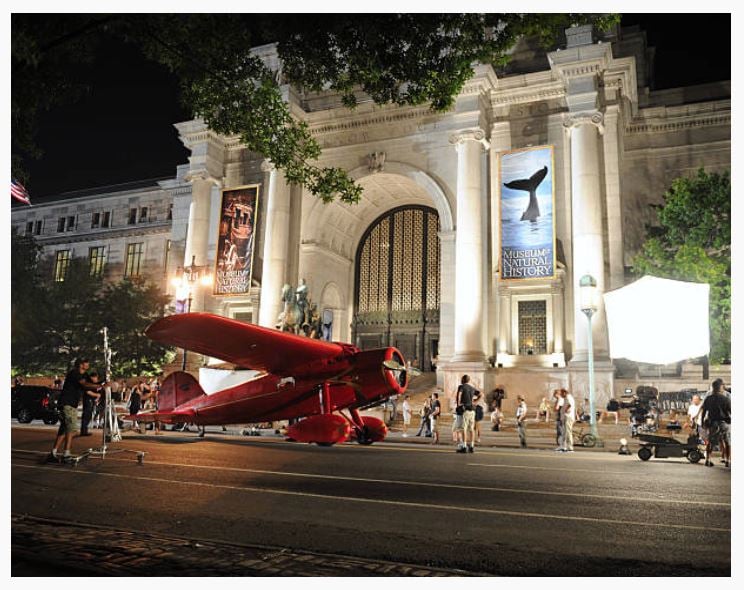
What happens to world-class museums when Hollywood comes to town?

Caroline Goldstein

Museums are some of the most recognizable architectural landmarks in the world—from the Frank Lloyd Wright-designed spiral of the Guggenheim to London’s Greek-inspired British Museum to the mint-green Winter Palace at Russia’s Hermitage Museum. These structures have become so iconic that they immediately communicate a particular sense of worldliness, taste, and history. So it’s not all that surprising that some of the world’s most venerable museums have enjoyed their fair share of screen time over the years.
Hollywood is known for its ability to turn the most outlandish schemes into heart-stopping scenarios, and many producers have conjured their cinematic magic to showcase museum halls and recreate them with painstaking detail. Below, a chronological look back at some of the most beloved feature films that have highlighted the world’s greatest museums as set pieces.

Still from the Louvre speed-viewing scene in Band of Outsiders (1964). Courtesy of Columbia Pictures.
Jean-Luc Godard’s timelessly cool take on a gangster movie is best known as the genesis of a much-referenced dance scene, but another highlight is provided by the mad dash through the Louvre museum in Paris. The three main characters set out to beat the world-record time for seeing the encyclopedic museum, and in keeping with New Wave Cinema’s irreverence, Godard sent the three actors tearing past art-historical treasures, without permission.

Diane Keaton and Woody Allen museum-hopping in Manhattan (1979). Courtesy of United Artists.
In Woody Allen’s self-described “love letter to New York,” filming locations included a roster of Manhattan’s most storied museums. The black-and-white film’s opening sequence features an interior shot of the Guggenheim’s spiral ramp, and the film continues with stops at the Met, the Museum of Natural History, and the Whitney. Here, Isaac (played by Allen) is caught in romantic entanglements with two women: a witty art-lover played by Diane Keaton and a beguiling but naive 17-year-old schoolgirl played by Mariel Hemingway. In a typically Woody Allen-esque manifestation, the film’s premiere party was hosted at the Whitney, and proceeds from the evening’s benefit were donated to the museum’s film department.
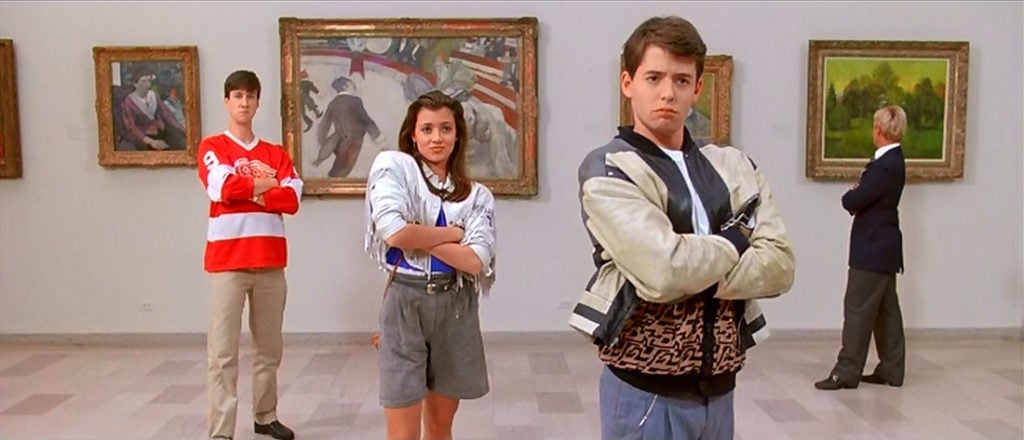
A still from Ferris Bueller’s Day Off (1986) set in the Art Institute of Chicago. Courtesy of Paramount Pictures.
In John Hughes’s classic Chicago-based romp, the Art Institute of Chicago serves as one of the several destinations for Ferris and company as they play hooky from school. In a contemplative moment, Cameron stands in front of the museum’s (real-life) marquee work, Georges Seurat’s Sunday Afternoon on the Island of La Grande Jatte—a work that Hughes grew up admiring on frequent visits to the museum.
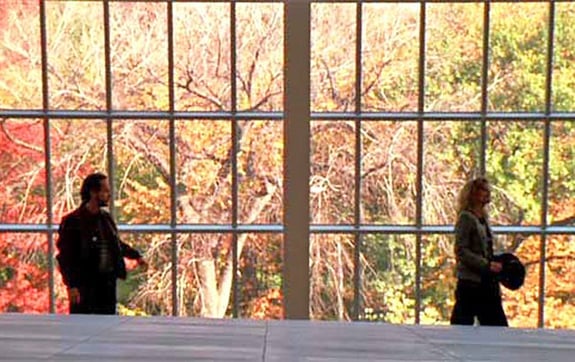
Still from When Harry Met Sally (1989), courtesy of © Metro-Goldwyn-Mayer Studios Inc.
Like Manhattan, the ultimate rom-com When Harry Met Sally takes viewers on a tour of New York, including a memorable scene at the Met’s Temple of Dendur. In front of the 2,000-year-old sandstone construction, Harry (Billy Crystal) delivers a roving soliloquy on “pepper, paprikash, and pecan pie,” in the perfect combination of cheeky humor and old-school grandeur.
Hollywood isn’t just obsessed with New York museums. The 2002 movie Russian Ark, which takes place in St. Petersburg’s Hermitage Museum, made cinematic history as the first feature film to be shot in a single, uninterrupted take. The 90-minute film tells the story of a time-traveler who is led through the historic institution by a 19th-century character who acts as a tour guide.
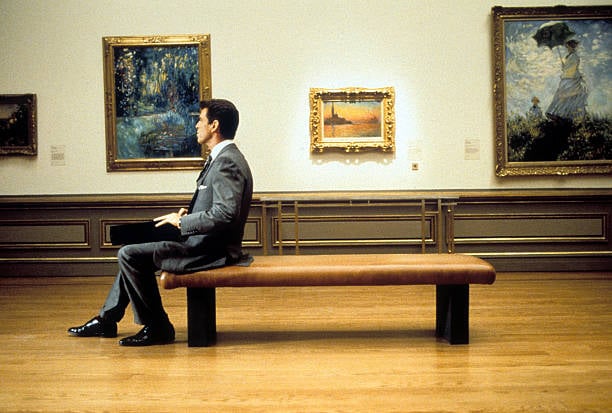
Pierce Brosnan sitting on a bench in an art gallery in a scene from the film The Thomas Crown Affair (1999). Photo by Metro-Goldwyn-Mayer/Getty Images.
Pierce Brosnan stars as a debonair businessman with a penchant for stealing priceless paintings. He meets his match in an alluring insurance agent tasked with recovering the artwork, played by Rene Russo. In the 1999 version, the heist takes place in the Met’s gallery. The museum declined to allow filming in situ, however. Instead, the crew built a replica of the museum and filmed other interior scenes in the comparably stately New York Public Library, although exterior shots of the Museum did make it into the final edit.
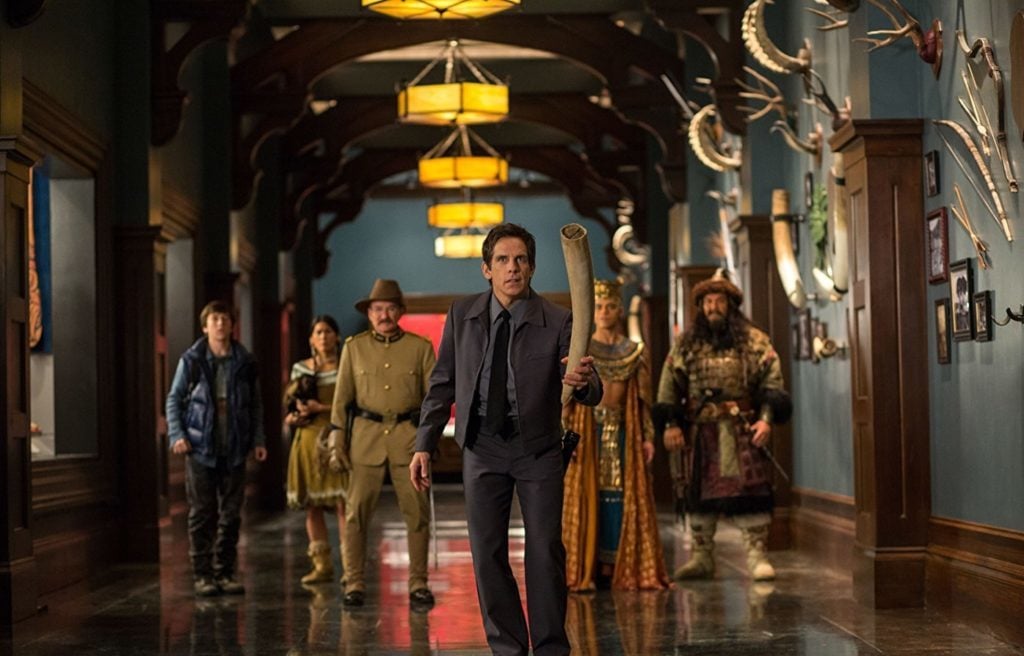
Still from “Night at the Museum.” Courtesy of IMBD.
Director Shawn Levy’s film series tells the story of a night guard played by Ben Stiller who has a raucous night in the museum when the characters and objects in the institution come to life after dark. In the first installment, New York’s Museum of Natural History was the setting for the re-animated exhibitions, sparking an unprecedented interest in the real-life wares of the institution. For the sequel, the crew heads to Washington, DC, and thanks to an agreement with the institution (which consists of 19 museums), 20th Century Fox was allowed to use the name and facilities for the movie, lending credibility to the feature, while the museum benefited from the international press of a major Hollywood release.
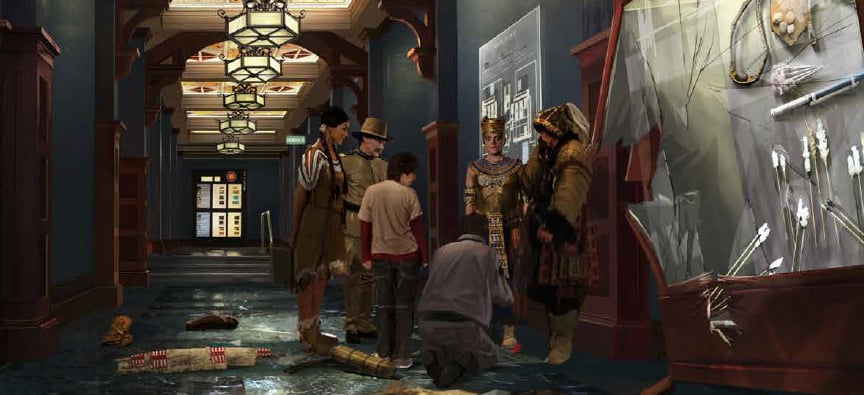
Still from Night at the Museum: Secret of the Tomb at the British Museum. Courtesy © 2014 Twentieth Century Fox Film Corporation.
In the final installment of Night at the Museum, the crew was granted permission to film in London’s British Museum overnight, after the throngs of tourists cleared out. In an email to artnet News, members of the museum’s staff reminisced about the experience, which involved 200 crew members, a 40-foot crane to capture the interior galleries, and six helium-balloons. The logistics involved taking casts of the museum’s unique doorknobs to ensure continuity in off-site filming, along with measurements and color samples of marble plinths, sculptures, and the interior architecture.
All of the institutions associated with the franchise reported visitor increases of at least 20 percent, and 27 percent of visitors at the British Museum who had seen the film reported a positive experience visiting the collection.
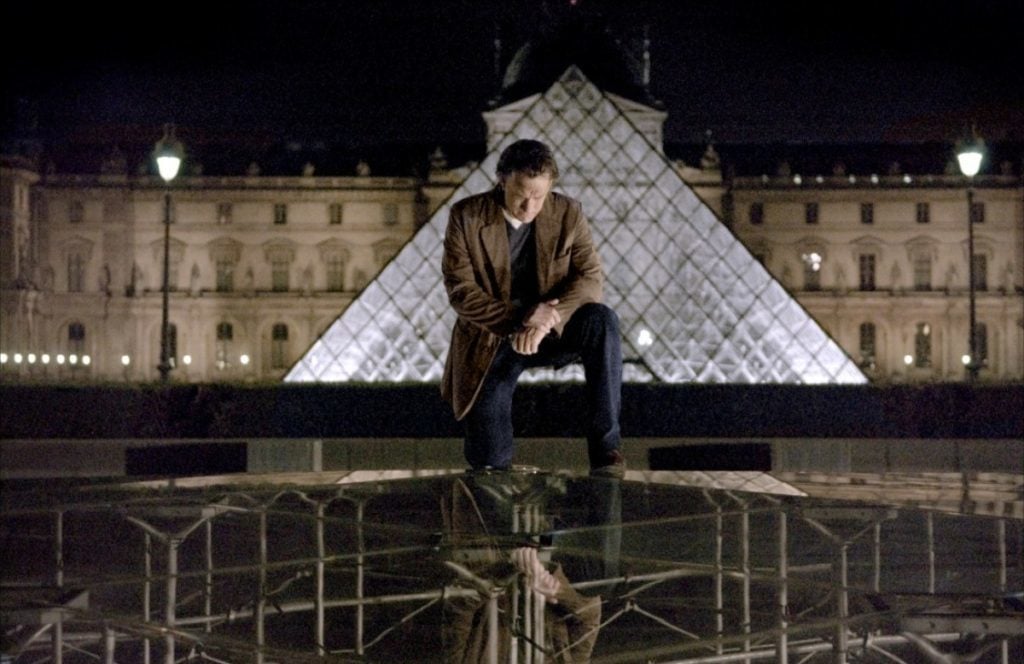
The final scene of The Da Vinci Code (2006) in front of the Louvre’s iconic pyramid. Courtesy of Columbia Pictures.
Sometimes though, museum officials aren’t thrilled at the prospect of having their prized collections subject to destructive action sequences or having factually dubious heists set in their hallowed halls. When it came time to translate the bestselling book Da Vinci Code onto the big screen, the Louvre and the Vatican both refused to participate in the filming. But box office sales are a powerful driver, and since film’s release the Louvre has warmed up to its role in Dan Brown’s fantasy world and is now hosting tours that lead visitors along the path taken by cryptologist Robert Langdon.
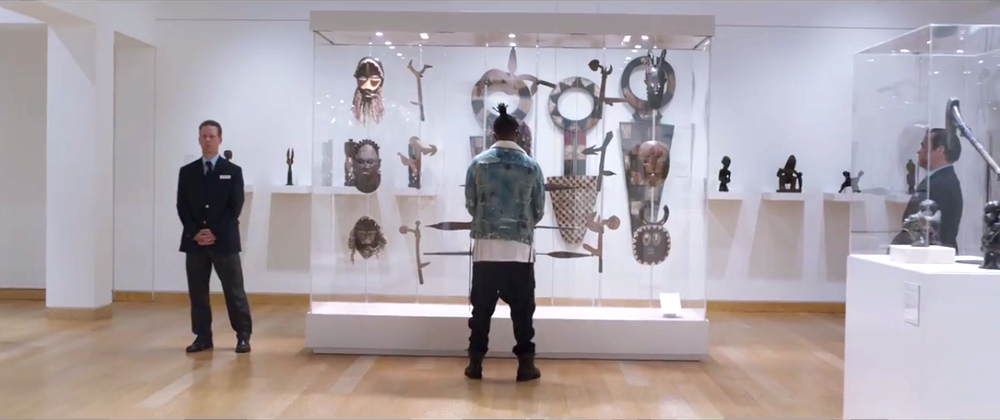
A screenshot of a scene from Black Panther where Killmonger prepares to steal a looted Vibranium artifact from the Museum of Great Britain. Courtesy of Marvel.
Marvel’s latest superhero flick has ushered in a surge of interest across the cultural landscape, from Afrofuturism to a reinvigorated debate about cultural appropriation and the role of European museum collection’s and their fraught colonial histories. In the film, Killmonger (Michael B. Jordan) goes to the fictional Museum of Great Britain (filmed at Atlanta’s High Museum of Art) to take back an artifact looted from Wakanda. Despite the fictionalized details, the scene references very real issues of restitution at museums around the world.
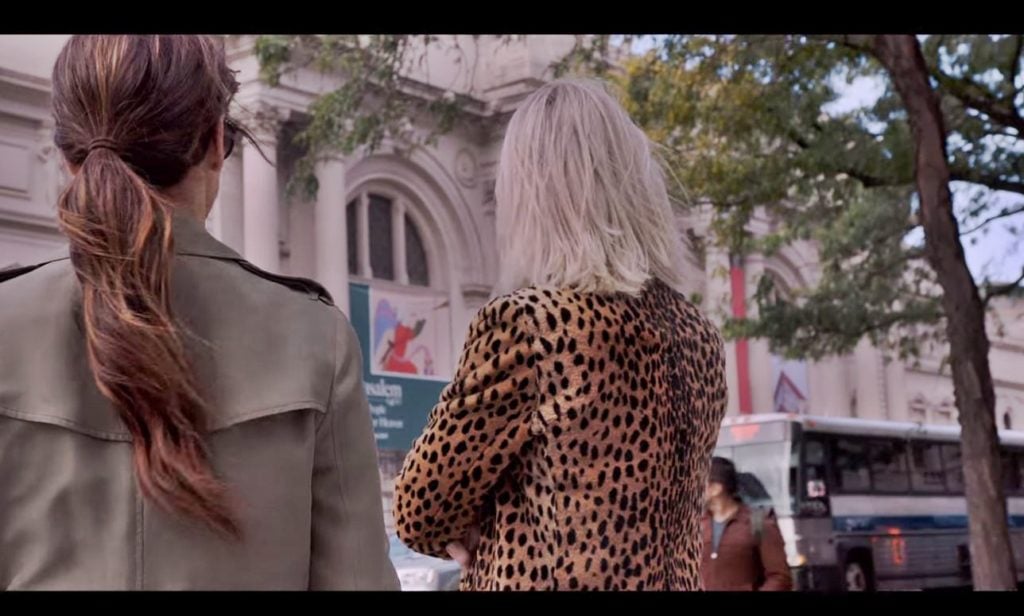
Sandra Bullock and Cate Blanchett in front of the Met, in Oceans 8 (2018). Screenshot via YouTube.
In December 2017, the long-awaited trailer for the girl-squad heist movie Ocean’s 8 dropped, eliciting a collective gasp from the art world. In this follow-up to Steven Soderbergh’s Ocean’s trilogy, a star-studded team of cons is led by Sandra Bullock to infiltrate the glamorous, super-exclusive Met Gala to steal a $150 million bauble, worn by a well-heeled attendee, played by Anne Hathaway. The Met may be a storied institution known for shows like the recent blockbuster “Michelangelo: Divine Draftsman and Designer,” but the star power that flocks to the Costume Institute Gala, chaired by Vogue’s Anna Wintour, is a fertile ground for staging a contemporary heist. To entice viewers further, the movie features cameos from Kim Kardashian and James Corden. And, in the most meta of all plot twists, Rihanna plays one of the eight thieves at the Met Gala, an event that she is co-hosting with Amal Clooney (wife of the original Danny Ocean, George Clooney) in real life this May.